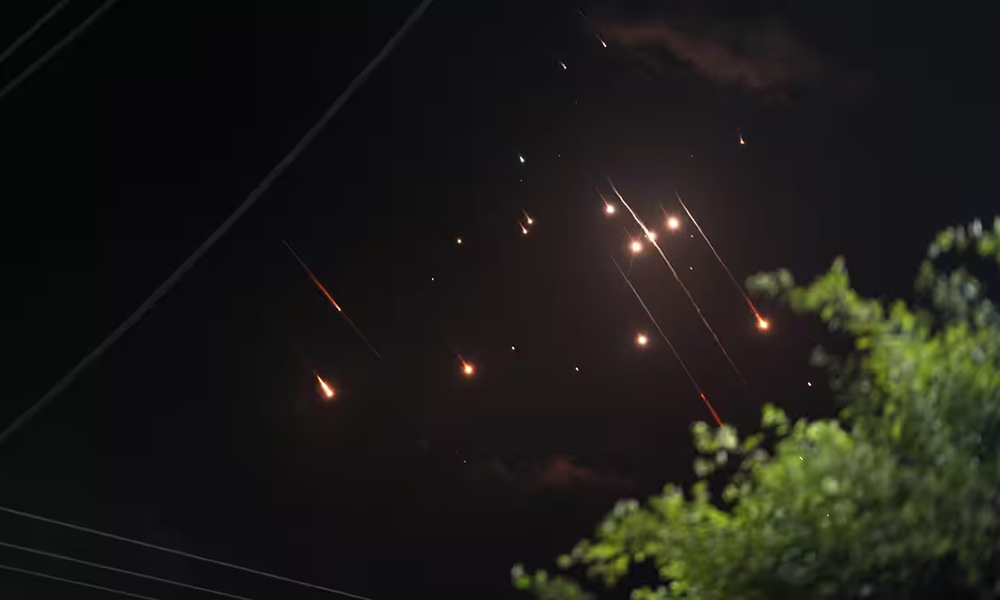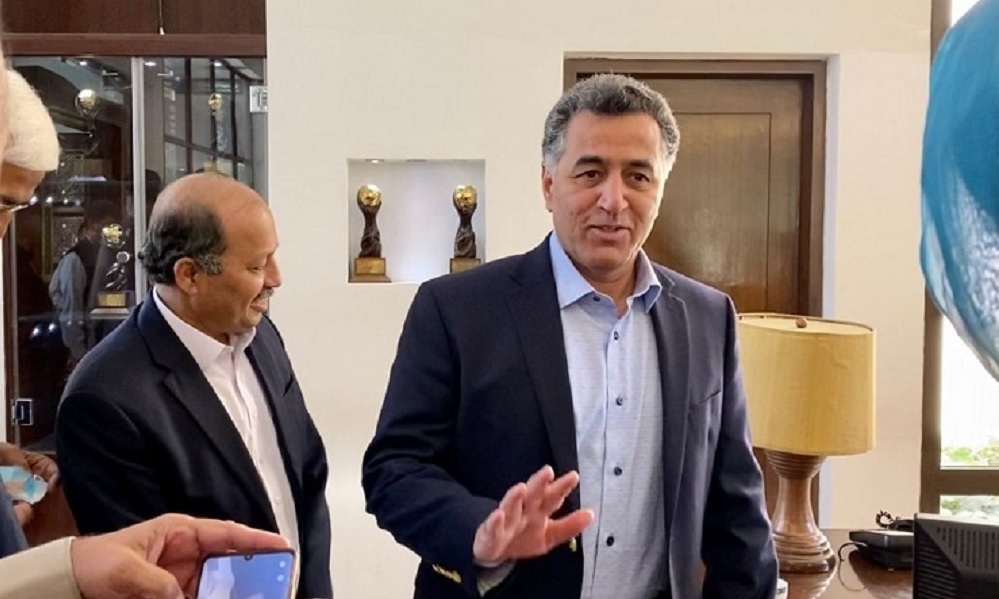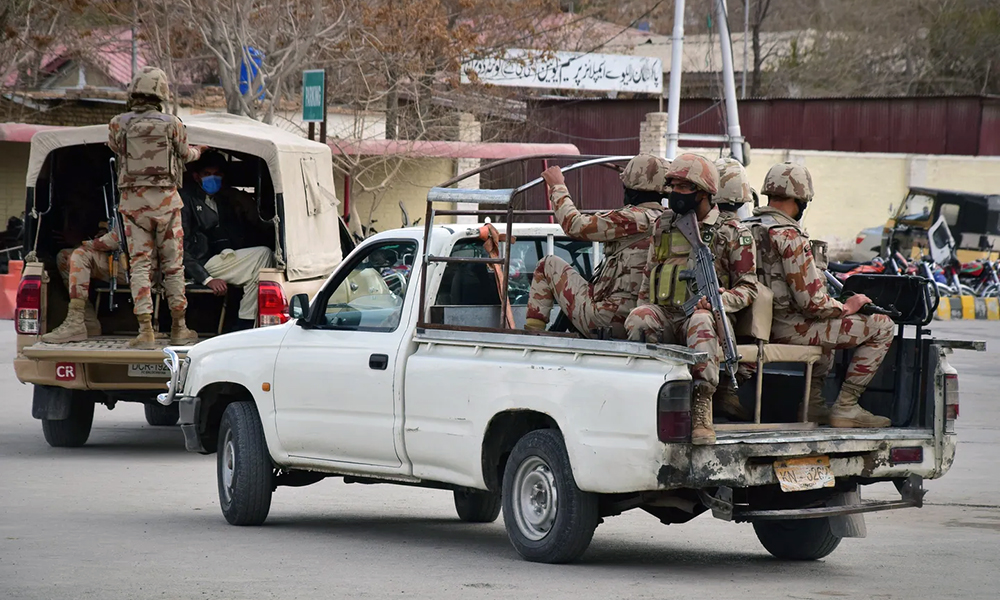Regional
Iran says attack on Israel is over as fears grow of wider conflict
Iran’s forces on Tuesday used hypersonic Fattah missiles for the first time, and 90% of its missiles successfully hit their targets in Israel, the Revolutionary Guards said.

Iran said early on Wednesday that its missile attack on Israel was over barring further provocation, while Israel and the U.S. promised to retaliate against Tehran as fears of a wider war intensified, Reuters reported.
Washington said it would work with longtime ally Israel to make sure Iran faced “severe consequences” for Tuesday’s attack, which Israel said involved more than 180 ballistic missiles.
The United Nations Security Council scheduled a meeting about the Middle East for Wednesday, and the European Union called for an immediate ceasefire.
“Our action is concluded unless the Israeli regime decides to invite further retaliation. In that scenario, our response will be stronger and more powerful,” Iranian Foreign Minister Abbas Araqchi said in a post on X early on Wednesday.
Israel renewed its bombardment early on Wednesday of Beirut’s southern suburbs, a stronghold of the Iran-backed armed Hezbollah group, with at least a dozen airstrikes against what it said were targets belonging the group, read the report.
Large plumes of smoke were seen rising from parts of the suburbs. Israel issued new evacuation orders for the area, which have largely emptied after days of heavy strikes.
Iran’s attack marked it biggest ever military blow against Israel.
Sirens sounded across the country and explosions rattled Jerusalem and the Jordan River valley as the entire population was told to move into bomb shelters.
No injuries were reported in Israel, but one man was killed in the occupied West Bank, authorities there said.
Iran described the campaign as defensive and solely aimed at Israeli military facilities. Iran’s state news agency said three Israeli military bases had been targeted.
Tehran said its assault was a response to Israeli killings of militant leaders and aggression in Lebanon against Hezbollah and in Gaza.
Israel activated air defences against Iran’s bombardment and most missiles were intercepted “by Israel and a defensive coalition led by the United States,” Israeli Rear Admiral Daniel Hagari said in a video on X, adding: “Iran’s attack is a severe and dangerous escalation.”
Israeli Prime Minister Benjamin Netanyahu vowed to hit back.
“Iran made a big mistake tonight – and it will pay for it,” he said at the outset of an emergency political security cabinet meeting late on Tuesday, according to a statement.
Iran’s General Staff of the Armed Forces said in a statement carried by state media that any Israeli response would be met with “vast destruction” of Israeli infrastructure. It also said it would target regional assets of any Israeli ally that got involved.
Fears that Iran and the U.S. could be drawn into a regional war have risen with Israel’s growing assault on Lebanon in the past two weeks, including the start of a ground operation there on Monday, and its year-old conflict in the Gaza Strip, Reuters reported.
Iran’s forces on Tuesday used hypersonic Fattah missiles for the first time, and 90% of its missiles successfully hit their targets in Israel, the Revolutionary Guards said.
Israel’s Hagari said central and southern Israel received limited strikes. A video released by the military showed a school in the central city of Gadera heavily damaged by an Iranian missile.
U.S. Navy warships fired about a dozen interceptors against Iranian missiles headed toward Israel, the Pentagon said. Britain said its forces played a part “in attempts to prevent further escalation in the Middle East”, without elaborating.
U.S. President Joe Biden expressed full U.S. support for Israel and described Iran’s attack as “ineffective.” Vice President Kamala Harris, the Democratic candidate for U.S. president, backed Biden’s stance and said the U.S. would not hesitate to defend its interests against Iran.
“We will act. Iran will soon feel the consequences of their actions. The response will be painful,” Israel’s U.N. Ambassador Danny Danon told reporters.
The White House similarly promised “severe consequences” for Iran and spokesman Jake Sullivan told a Washington briefing the U.S. would “work with Israel to make that the case.”
Sullivan did not specify what those consequences might be, but he stopped short of urging restraint by Israel as the U.S. did in April when Iran carried out a drone and missile attack on Israel. The Pentagon said Tuesday’s airstrikes by Iran were about twice the size of April’s assault.
U.N. Secretary-General Antonio Guterres condemned what he called “escalation after escalation”, saying: “This must stop. We absolutely need a ceasefire.”
French President Emmanuel Macron said in a statement that he strongly condemns Iran’s new attacks on Israel, adding that in a sign of its commitment to Israel’s security it mobilised its military resources in the Middle East on Wednesday.
Macron reiterated France’s demand that Hezbollah cease its terrorist actions against Israel and its population, but also wished for Lebanon’s sovereignty and territorial integrity to be reinstated in strict compliance with a United Nations Security Council resolution.
EU foreign policy chief Josep Borrell also called for an immediate regional ceasefire. “The dangerous cycle of attacks and retaliation risks … spiralling out of control,” he posted on X.
British Prime Minister Keir Starmer spoke with the leaders of Germany and France, and they agreed on a need for restraint from all sides, Downing Street said.
Nearly 1,900 people have been killed and more than 9,000 wounded in Lebanon in almost a year of cross-border fighting, most in the past two weeks, according to Lebanese government statistics on Tuesday.
Regional
Pakistan’s ex-spy chief jailed for 14 years in rare military rebuke

A military court in Pakistan jailed former spy chief Faiz Hamid for 14 years on four charges including interference in politics, the army said on Thursday, in a rare conviction of a once-powerful general in the South Asian nation.
Hamid, in custody and under trial since August last year, was the chief of Pakistan’s powerful Inter-Services Intelligence agency from 2019 to 2021 under jailed former Prime Minister Imran Khan, and the two were considered close allies.”The accused was tried on four charges,” the military said in a statement, Reuters reported.
The charges ranged from engaging in political activities and violating the Official Secrets Act in a way detrimental to safety and state interest to misuse of authority and resources as well as causing wrongful loss to individuals, it added.
TIES TO JAILED FORMER PM IMRAN KHAN
The former general was found guilty on all the charges, the military said, without detailing the incidents. His conviction followed “lengthy and laborious legal proceedings”, it added, and Hamid has a right of appeal.
He also faces a separate investigation of his role in May 2023 attacks by thousands of Khan’s supporters on scores of military installations and offices to protest against the arrest of the 72-year-old former cricket star.
Information Minister Attaullah Tarar said Hamid had crossed “red lines” and acted as an advisor to Khan’s party to try to create chaos in the country.
Hamid’s lawyers or family could not be reached for comment. Khan’s PTI party did not immediately respond to a Reuters request for comment.
Khan has been in jail since August 2023.
Khan and nearly 150 of his party leaders and supporters have already been indicted by an anti-terrorism court on charges of inciting the attacks that also targeted military headquarters in the garrison city of Rawalpindi.
Khan and his associates deny the charges.
Hamid’s close ties to Khan, who blames the military for ousting him from power in 2022, were a source of tension between the cricketer-turned-politician and the military.
The military, which has directly ruled the nation of 241 million for more than three decades of its 77-year independent history, plays a big role in making or breaking governments.
Regional
Six Pakistani soldiers killed in TTP attack in Kurram District
Islamabad has accused TTP fighters of using Afghan territory to stage attacks inside Pakistan, a claim Kabul denies, insisting that Pakistan’s security problems are internal matters.

Six Pakistani soldiers were killed and four others injured when militants attacked a security checkpoint in northwest Pakistan’s Kurram district, officials confirmed on Tuesday. The Tehreek-e-Taliban Pakistan (TTP) claimed responsibility for the assault.
The attack took place in the Manato area late Monday afternoon, according to a police officer at the district’s emergency control room. A government official, speaking on condition of anonymity, told AFP that two militants were also killed during the exchange of fire.
Security forces later identified one of the dead militants as local TTP commander Usman Khyberi.
The incident comes amid heightened tensions between Pakistan and Afghanistan, as both sides struggle to maintain a fragile calm following deadly border clashes in October—the worst since the Islamic Emirate took control of Kabul in 2021.
Sporadic skirmishes have continued, including heavy exchanges of fire last week that left at least five people dead.
Islamabad has accused TTP fighters of using Afghan territory to stage attacks inside Pakistan, a claim Kabul denies, insisting that Pakistan’s security problems are internal matters.
Efforts to broker a lasting truce have so far failed. Three rounds of peace talks—facilitated by Qatar, Türkiye, and Saudi Arabia—have not produced a breakthrough.
Regional
Putin questions US punishing India for buying Russian oil
Hours earlier, Modi received Putin at the airport in Delhi, a rare gesture underlining the warm ties between the leaders.

Russian President Vladimir Putin challenged heavy U.S. pressure on India not to buy Russian fuel if the U.S. could do so as he began a two-day state visit, where he was embraced on arrival by Indian Prime Minister Narendra Modi.
Putin spoke in comments to Indian broadcaster India Today, aired hours after landing in New Delhi for a visit during which both countries are seeking to boost mutual trade and expand the variety of items in transactions.
New Delhi and Moscow have strong ties going back to the days of the former Soviet Union, and Russia has been the main source of arms for India for decades. India has also emerged as the top buyer of seaborne Russian oil despite Western sanctions imposed after Moscow launched its invasion of Ukraine in February 2022.
India’s crude imports, however, are set to hit a three-year low this month following a punitive U.S. tariff on Indian goods and a tightening of sanctions on Russia, as U.S. President Donald Trump’s administration says India’s purchases of cheap Russian oil help finance Moscow’s war in Ukraine.
“The United States itself still buys nuclear fuel from us for its own nuclear power plants. That is also fuel,” Putin told India Today.
“If the U.S. has the right to buy our fuel, why shouldn’t India have the same privilege? This question deserves thorough examination, and we stand ready to discuss it, including with President Trump,” he said.
India has said Trump’s tariffs are unjustified and unreasonable and pointed at ongoing U.S. trade with Moscow. The U.S. and European Union continue to import billions of dollars worth of Russian energy and commodities, ranging from liquefied natural gas to enriched uranium.
“There is a certain decline in overall trade turnover during the first nine months of this year,” Putin said when asked if Indian oil purchases had fallen under pressure from the West.
“This is just a minor adjustment. Overall, our trade turnover stands almost at the same level as before.”
He added: “Trade in petroleum products and crude oil … Russian oil, is running smoothly in India.”
Asked how India and Russia should deal with Trump and his tariffs, Putin said the U.S. President has advisers who believe that implementing such tariff policies ultimately benefits the U.S. economy. “We hope that, in the end, all violations of World Trade Organization regulations will be rectified,” he said.
Hours earlier, Modi received Putin at the airport in Delhi, a rare gesture underlining the warm ties between the leaders.
They embraced on a red carpet on the tarmac and then drove away in the same vehicle for a private dinner hosted by Modi.
Senior Russian ministers and a large Russian business delegation were in New Delhi for Putin’s visit and the two leaders will hold summit talks on Friday when they are expected to announce a raft of deals.
“Delighted to welcome my friend, President Putin to India. India-Russia friendship is a time-tested one that has greatly benefited our people,” Modi posted on X ahead of the dinner.
India and Russia aim to raise two-way trade to $100 billion by 2030. Their commerce rose more than five-fold from about $13 billion in 2021 to near $69 billion in 2024–25, almost entirely driven by Indian energy imports.
Bilateral trade eased to $28.25 billion in April–August 2025, reflecting a decline in crude oil imports.
At the same time, India is looking for new destinations to increase exports of its goods hit by the punishing 50% tariff imposed by Trump.
Russia wants to import more Indian goods to balance bilateral trade, which is currently heavily skewed towards energy, Deputy Kremlin Chief of Staff Maxim Oreshkin told a business conference in New Delhi earlier on Thursday.
Indian Trade Minister Piyush Goyal said New Delhi wants to diversify exports to Russia and increase sales of automobiles, electronics goods, data-processing equipment, heavy machinery, industrial components, textiles, and foodstuffs.
-

 Sport4 days ago
Sport4 days agoILT20: Desert Vipers edge Gulf Giants in historic super over thriller
-

 Latest News2 days ago
Latest News2 days agoMuttaqi: Afghanistan’s progress requires both religious and modern education
-

 Regional4 days ago
Regional4 days agoSix Pakistani soldiers killed in TTP attack in Kurram District
-

 Business4 days ago
Business4 days agoTrade bodies warn almost 11,000 Afghan transit containers stuck at Karachi port
-

 World4 days ago
World4 days agoPowerful 7.6 earthquake hits northern Japan, tsunami warnings issued
-

 Latest News3 days ago
Latest News3 days agoTrump calls Afghanistan a ‘hellhole’ country as US expands immigration restrictions
-

 Sport5 days ago
Sport5 days agoSorkh Poshan Khafi defeats Sarsabz Yashlar 4-0 in Afghanistan Champions League
-

 Sport3 days ago
Sport3 days agoCommanding wins for Arman FC and Sarsabz Yashlar in Afghanistan Champions League
























